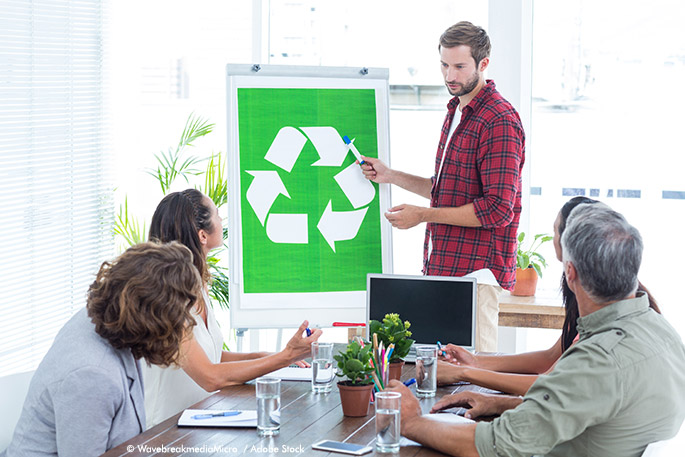
Canada’s got a reputation for being a nation of nature-lovers that treasure the environment, which is no real surprise; we’ve got a lot of natural environment to love! So it’s also not all that unexpected that, as a country, we’ve also taken steps in our urban centres to try and reduce the amount of unrecoverable garbage that we put into landfills, and recycle what we can.
In theory, most people like the idea of recycling. In practice, it can be a little trickier to get people on board, especially in the workplace. Understandably, most people at work will be more focused on doing what they’ve been hired to do, and recycling is usually not one of those things in the job description. But you can integrate it into the working lifestyle of your company or business with a few educational tips. So why is it important to recycle? Here are 3 ways to explain.
1 – Break Out The Facts
While no one really enjoys a lecture, information is still important. Make it clear that as a Canadian business, you are striving to “hold up your end of the deal” for a better environment that will benefit us today and, more importantly, the next generation of children and grandchildren.
Take the time to point out just how much a typical business consumes and discards regarding supplies like paper, plastic containers, ink, and other work products. If you really want to get specific, you can even have experts come in to conduct a waste audit, so you’ll know exactly how much your business is wasting.
2 – Keep It Simple
The “KISS” rule, or “Keep It Simple, Stupid” applies to many different subjects, and recycling is one of them. Teaching people the importance of recycling is made easier by making the recycling effort itself easier. Colour-coded containers for different classes of recyclables, such as glass, plastic, and paper go a long way towards quickly informing people, which waste item, should go where.
If they need more help, illustrations or symbols on these containers can also help. This way, people understand that efficient recycling is about making sure that the right materials go to the right places. By spending a few extra moments properly disposing of recycled material, a real difference can be made. Putting recycle bins in strategic locations, such as kitchens, exits, or even individual desks, can also help.
3 – Incentivize Recycling
As with any education, results tend to last longer when you use the carrot instead of the stick. Lessons on recycling stick with more positive motivation. Rewards, perks or other bonuses for correctly classifying recycled material, and contributing a good amount of it can be very useful in getting people on board with recycling quickly.
This also tends to be far more effective than disciplinary actions for failing to comply. Punishment can breed resentment, but rewards merely encourage repeat performances of the desired behavior. These don’t have to be big, financial rewards, but little things like gift certificates or bonuses at work can help reinforce learning.
Eventually, as time passes, the initial learning curve for understanding the importance of recycling and incorporating new practices into the company will be over. At that point, recycling will be second nature to people in the workplace and, with a little bit of extra consideration, is likely to carry over to the home as well!




































































































































 Three Ways to Engage Teams and Clients to Maximize Your Recycling Program Engagement
Three Ways to Engage Teams and Clients to Maximize Your Recycling Program Engagement  How to Integrate Accessibility Into Your Sustainability Planning
How to Integrate Accessibility Into Your Sustainability Planning  Why Park Benches Can Promote Workplace Well-Being
Why Park Benches Can Promote Workplace Well-Being 
